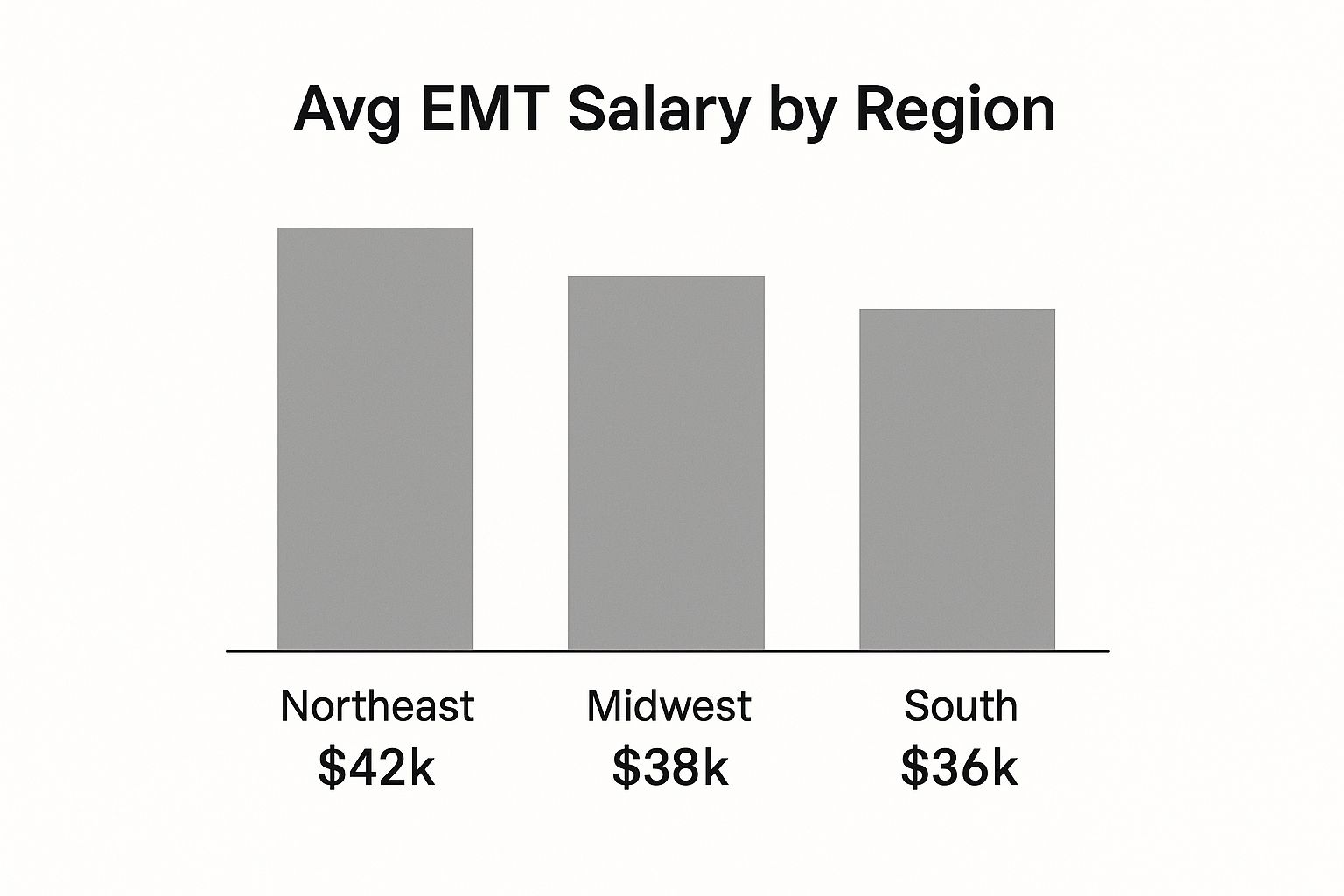What Do EMTs Make? Find Out Your Earning Potential Today
When you start asking, "what do EMTs make," you'll find the answer isn't a single number. On average, most EMTs earn an hourly wage of around $20.40. But that's just a starting point—your actual annual salary can swing pretty wildly depending on your experience, where you work, and who you work for.
Your Earning Potential as an EMT

Getting a handle on your potential salary is the first real step in mapping out a solid career in emergency medical services. Let's be honest, passion is what gets most of us into this field, but knowing the financial side of things helps you plan for the future.
EMT pay isn't a fixed number; it's a spectrum. As of mid-2025 in the United States, the average hourly wage for an Emergency Medical Technician is right around $20.40. Think of that as the midpoint. The typical pay scale spans from about $17.07 for newer folks (the 25th percentile) up to $22.60 for more experienced EMTs (the 75th percentile), which shows a clear path for growth as you get more time on the job. If you want to dig deeper into the numbers, ZipRecruiter has a great breakdown.
This all means your starting pay will almost certainly be different from what a seasoned veteran is making.
Practical Example: A newly certified EMT in a rural Mississippi town might start near the lower end, around $10.34 per hour. In contrast, an EMT with 10 years of experience working for the San Francisco Fire Department could earn up to $28.61 per hour or more, not including overtime.
To give you a clearer picture, here’s a quick look at the national averages.
EMT Salary at a Glance: National Averages
This table breaks down the typical salary ranges for EMTs across the United States. It's a handy way to see the earning potential at different points in your career, from just starting out to being a top earner in the field.
| Percentile | Approximate Hourly Wage | Approximate Annual Salary |
|---|---|---|
| 25th Percentile | $17.07 | $35,500 |
| 50th Percentile (Median) | $20.40 | $42,432 |
| 75th Percentile | $22.60 | $47,000 |
| 90th Percentile | $28.61 | $59,500 |
As you can see, there's a significant jump from the median pay to what the top 10% of earners are making. This highlights just how much factors like location, experience, and employer can impact your bottom line.
The Four Factors That Shape Your Paycheck

Let's get one thing straight: an EMT's salary isn't some fixed number pulled out of thin air. It’s a dynamic figure that hinges on a few crucial variables. Getting a handle on these factors is the first real step you can take toward maximizing your earnings in this field.
Think of your base salary potential like a vehicle. Where you drive it, how much you upgrade it, and who owns it will ultimately determine how far and fast it can take you.
The four big drivers of your paycheck are your geographic location, level of certification, years of experience, and the type of employer you work for. Each one plays a unique role, and it's also worth remembering that your gross pay isn't what you take home. Understanding deductions like Federal Income Tax (FIT) is key to knowing what actually hits your bank account.
Location and Certification Level
Where you physically work is probably one of the biggest pieces of the puzzle. An EMT working in a major city like San Francisco or New York will almost always earn more than someone in a small, rural town. That's a simple function of higher costs of living and greater demand for services. That difference can easily be 20-30% or more.
Your certification level is another huge multiplier for your income. No single move has a bigger impact than advancing from an EMT-Basic to a Paramedic. It reflects a massive leap in skills, responsibilities, and scope of practice, and your paycheck will show it.
Experience and Employer Type
In this line of work, experience is proof you know what you’re doing, and it gets rewarded financially. Most employers have structured raises based on how long you've been on the job. A brand-new EMT might start at a base rate, but a pro with five or more years in the field has proven their reliability and expertise—and can command a much higher wage.
Finally, who signs your checks matters. A lot. Your earning potential can swing dramatically depending on where you work.
- Private Ambulance Services: These are often the starting point for new EMTs. They tend to offer competitive starting pay but might not have the same long-term growth potential as other employers.
- Hospitals and Clinics: Working for a hospital can mean more stable hours and solid benefits. The pay usually lines up with the standard salary ranges for other healthcare professionals in your area.
- Government Agencies (Fire/Police Depts.): These are frequently the highest-paying jobs in the field. They come with excellent salaries, union protection, and comprehensive benefits packages that often include pensions.
Actionable Strategies to Increase Your EMT Salary

Knowing the numbers is one thing, but the real question is how you can actually bump up your own paycheck. The good news is you're not just stuck waiting for those small, yearly raises. There are some very direct, proactive steps you can take to put more money in your pocket, starting now.
One of the quickest ways to see a bigger paycheck is by taking advantage of overtime and shift differentials. EMS is a 24/7 business, which means there are almost always extra hours up for grabs. Picking up a few weekend, holiday, or night shifts can make a huge difference, since those hours usually pay a premium rate.
Practical Example: Imagine your base pay is $20 an hour. A standard overtime rate of 1.5x bumps you up to $30 an hour. Just picking up one extra 12-hour shift per month at that rate adds $360 to your monthly income, or $4,320 per year.
Pursue Specialized Certifications
Another powerful move is to get specialized certifications. Think of these as upgrades that make you a more valuable, in-demand asset to any team. A little investment in training now can pay off big time down the road.
A few popular and valuable certifications to consider are:
- Critical Care Transport (CCT-EMD): This skill is in high demand and qualifies you to handle critically ill patients during transfers between facilities.
- Tactical EMT (TEMS): With this training, you'll be prepared to provide medical support during high-risk law enforcement operations.
- Community Paramedicine: This is a growing field where you provide preventive care and health management in non-emergency settings.
These advanced skills don't just boost your pay; they open up doors to more interesting and dynamic roles. Of course, managing all those certs and schedules for a whole team can get complicated.
Actionable Insight: For agencies, manually tracking certification expirations is time-consuming and risks non-compliance, which can lead to fines or being unable to staff a unit. Using personnel management tools like the https://resgrid.com/apps automates these reminders, saving significant administrative hours—and money—by preventing costly lapses.
Master Salary Negotiation
Finally, don’t ever underestimate the power of negotiation, especially when you're looking at a new job. Before you even walk into an interview, do your homework. Research what EMTs with your experience and certifications are making in your specific area. Walking into that conversation armed with real data gives you a solid leg to stand on.
A key part of landing those better-paying jobs is highlighting your accomplishments on your resume, not just listing your duties. When you can clearly show the value you bring to the table, you’re in a much stronger position to ask for the salary you've earned.
EMT Versus Paramedic Pay: A Head-to-Head Comparison
If you're an EMT wondering about your earning potential, the conversation almost always leads to one place: becoming a Paramedic. It's the most direct path to a significant pay bump in this field, but it's a big leap. You've got to understand what you're getting into.
The fundamental difference boils down to the scope of practice. EMTs are the bedrock of EMS, providing basic life support—think CPR, splinting injuries, and administering oxygen. A Paramedic, on the other hand, delivers advanced life support. This isn't just a small step up; it requires a much deeper investment in education, often an associate's degree. We're talking 1,200 to 1,800 hours of intense training, a world away from the 150 to 190 hours required for an EMT-Basic certification.
With that expanded skillset and responsibility comes a much bigger paycheck. But as the image below shows, even location plays a huge role in an EMT's salary.

You can see right away how an EMT's pay can swing by thousands of dollars a year just based on the region, with the Northeast leading the pack. While paramedics also see this regional variance, their baseline pay is consistently higher no matter where they work.
Let's break down the key differences between these two crucial roles.
EMT vs Paramedic Pay and Responsibilities
| Attribute | EMT (Basic) | Paramedic |
|---|---|---|
| Average Salary | ~$40,000-$50,000 | ~$76,606 |
| Training Hours | 150-190 Hours | 1,200-1,800 Hours |
| Scope of Practice | Basic Life Support (BLS) | Advanced Life Support (ALS) |
| Key Duties | CPR, splinting, oxygen, basic patient assessment, transport. | IVs, intubation, advanced cardiac life support (ACLS), administering a wide range of medications. |
| Autonomy | Follows protocols under medical direction. | More autonomy in the field to make critical patient care decisions. |
The table really lays it out. The jump to Paramedic is a serious commitment in time and effort, but the payoff in both salary and the ability to provide critical care is undeniable.
The Financial Leap to Paramedic
The salary jump from EMT to Paramedic isn't just a small bump—it's substantial. Paramedics fall into the broader Emergency Medical Services (EMS) personnel category, which naturally commands higher pay due to their advanced skills.
As of August 2025, the national average for EMS workers, a group that includes paramedics, is around $76,606 per year. That breaks down to about $36.83 per hour. The top earners in the field can even pull in over $109,000 annually. If you want to dig deeper into the numbers, you can discover more insights about EMS pay on ZipRecruiter.com.
Practical Example: An EMT earning the median $42,432 who becomes a paramedic earning the median $76,606 sees an annual income increase of over $34,000. This means the investment in paramedic school could pay for itself within just a couple of years, offering a direct path to a much higher income bracket within the emergency response field.
Of course, the decision to level up isn't just about the money. It's about taking on more autonomy, tackling greater challenges, and being able to provide a much higher level of care to patients when every second counts. The bigger salary simply reflects the immense value and responsibility that comes with those advanced skills.
High Paying Career Paths Beyond the Ambulance
Your EMT certification is a lot more than just a ticket to ride in an ambulance; think of it as a launchpad for a whole host of higher-paying roles. Many EMTs quickly discover that their field experience is a huge asset in fast-paced hospital emergency rooms. Making the jump to an Emergency Room Technician (ER Tech) is a natural—and often lucrative—next step.
This move frequently means a more predictable schedule and a nice pay bump, since hospitals can typically offer more competitive wages than private ambulance services. You’re using the same exact core skills—patient assessment, taking vitals, and staying cool under pressure—just in a different, often higher-paying, environment.
Practical Example: An EMT earning $20/hour at a private ambulance service might see their pay increase to $25/hour or more as an ER Tech at a major hospital, along with better benefits. This single career move could add over $10,000 to their annual salary.
From Field Work to Corporate Roles
Another path that can be really rewarding financially is moving into industrial or corporate safety. Big construction sites, manufacturing plants, and even large corporate campuses hire EMTs to be on-site medical responders. These jobs usually offer better hours and a higher base salary because you become a vital part of a company’s safety infrastructure.
Beyond direct patient care, you can also put your expertise to work in other ways. With a little extra training, you can become a certified CPR and First Aid instructor. This lets you train corporate teams or community groups, which can be a great side hustle or a full-time career in its own right. Managing these different career paths takes solid organization, and it's interesting to see the kind of features that help first responders keep on top of their duties and schedules.
Finally, your EMT background is an excellent foundation for a career in law enforcement or as a firefighter. Many departments really value the medical training EMTs bring to the table. It can give you a competitive edge in the hiring process and open the door to a career with fantastic pay, benefits, and long-term stability.
Common Questions About EMT Pay and Career Growth
Jumping into a new career path always stirs up a lot of questions, especially about the money and where you can go with it. When people ask "what do EMTs make," what they're really asking is how to get started, how to make a decent living, and what the future looks like. Let's break down some of the most common questions we hear.
One of the best things about becoming an EMT is how quickly you can get on the street. You can wrap up an EMT-Basic (EMT-B) program and get certified in as little as three to six months. That's a huge plus—you can be earning a real paycheck in a fraction of the time it takes for other healthcare careers, all without racking up years of student debt.
Once you’re working, you’ll find that overtime is a dependable way to really bump up your income. EMS is a 24/7 world, and since OT is paid at 1.5 times your base rate, those extra shifts add up fast.
Maximizing Your Starting Salary
Even when you're just starting out, you might have more wiggle room on pay than you think, especially if you're talking to a private ambulance company. Don't be shy about asking for more if you've got the goods to back it up.
To give yourself some leverage, you should:
- Do your homework: Find out what the going rate for EMTs is in your specific area.
- Show off your skills: If you have extra certifications, like being a CPR instructor, make sure they know it.
- Highlight other experience: Things like volunteer work or military service can make you a much more attractive candidate.
Even an extra $0.50 or $1.00 an hour can mean thousands more in your pocket over the course of a year, so it's a conversation worth having. For more complex questions about managing schedules or personnel, it's always good to dig into dedicated resources. You can get answers to specific operational questions through our support channels.
Practical Example: We are often asked if fire department EMTs really make more money. The short answer is yes, they generally do. A municipal fire department EMT in a unionized role often earns a higher base salary, receives scheduled raises, and gets a comprehensive benefits package that includes a pension. While the hiring process is more competitive, the long-term financial payoff can be huge compared to a non-union private service role.
At Resgrid, we build the tools first responders need to manage the chaos of their daily operations. Our platform handles everything from dispatching and personnel management to real-time communication, keeping your team in sync and running smoothly. Learn more about how Resgrid can support your agency.

